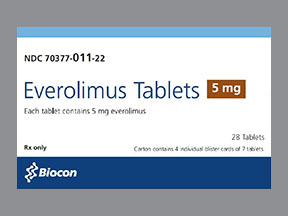
Afinitor Coupons & Savings Card – Discount Prices from $458.12
Brand for: Everolimus
My prescription
Edit
5MG, Everolimus (30 Tablets)
Select pharmacy

CVS
$15169.29
COUPON PRICE
Albertsons
$458.12
COUPON PRICE
Walgreens
$484.50
COUPON PRICE
Walmart
$15995.05
COUPON PRICEAfinitor savings card
Show this card to your pharmacist
Albertsons
$458.12
BIN
ID
PCN
GRP
019876
LHD9CC7CD3
CHIPPO
LHX
Powered by
Related kinase inhibitors prescriptions
More prescriptions for tuberous sclerosis complex
Related kinase inhibitors prescriptions
More prescriptions for tuberous sclerosis complex
Afinitor (Everolimus) dosage forms
Dosage Quantity Price from Per unit 2.5MG 1 Tablet $39.99 $39.99 2.5MG 28 Tablets $876.72 $31.31 2.5MG 30 Tablets $938.70 $31.29 5MG 30 Tablets $458.12 $15.27 5MG 1 Tablet $24.85 $24.85 5MG 28 Tablets $428.58 $15.31 7.5MG 1 Tablet $28.07 $28.07 7.5MG 28 Tablets $542.96 $19.39 7.5MG 30 Tablets $581.10 $19.37 10MG 1 Tablet $38.58 $38.58
| Dosage | Quantity | Price from | Per unit |
|---|---|---|---|
| 2.5MG | 1 Tablet | $39.99 | $39.99 |
| 2.5MG | 28 Tablets | $876.72 | $31.31 |
| 2.5MG | 30 Tablets | $938.70 | $31.29 |
| 5MG | 30 Tablets | $458.12 | $15.27 |
| 5MG | 1 Tablet | $24.85 | $24.85 |
| 5MG | 28 Tablets | $428.58 | $15.31 |
| 7.5MG | 1 Tablet | $28.07 | $28.07 |
| 7.5MG | 28 Tablets | $542.96 | $19.39 |
| 7.5MG | 30 Tablets | $581.10 | $19.37 |
| 10MG | 1 Tablet | $38.58 | $38.58 |
| 10MG | 28 Tablets | $752.08 | $26.86 |
| 10MG | 30 Tablets | $804.73 | $26.82 |
What is the drug Afinitor used for?
Afinitor is used to treat certain types of cancers and tumors. It is commonly prescribed for advanced kidney cancer, certain types of breast cancer, and neuroendocrine tumors of the pancreas, stomach, intestines, or lung. Additionally, it is used to treat certain types of brain tumors and tuberous sclerosis complex (TSC)-associated renal angiomyolipoma and subependymal giant cell astrocytoma (SEGA).
Is Afinitor a targeted therapy?
Yes, Afinitor (everolimus) is considered a targeted therapy. It works by inhibiting the mTOR pathway, which is involved in cell growth and proliferation, making it effective in treating certain types of cancer.
What foods should you avoid while taking Afinitor?
While taking Afinitor, it is advised to avoid consuming grapefruit and grapefruit juice. Grapefruit can increase the levels of the medication in the bloodstream, potentially leading to increased side effects. It is also recommended to avoid St. John's Wort, as it can decrease the effectiveness of Afinitor. Always consult with a healthcare provider for personalized dietary advice while on medication.
What are the disadvantages of everolimus?
Everolimus can have several disadvantages or side effects. Common side effects include mouth ulcers, infections, fatigue, and rash. It may also cause more serious issues such as increased risk of infections, kidney problems, and lung issues like pneumonitis. Everolimus can affect blood cell counts, leading to anemia or increased bleeding risk. Additionally, it may cause elevated blood sugar and cholesterol levels. Patients should be monitored regularly to manage these potential side effects effectively.
Is Afinitor a form of chemotherapy?
Afinitor is not classified as traditional chemotherapy. It is an mTOR inhibitor, which is a type of targeted therapy. It works by interfering with specific pathways that are involved in the growth and spread of cancer cells.
